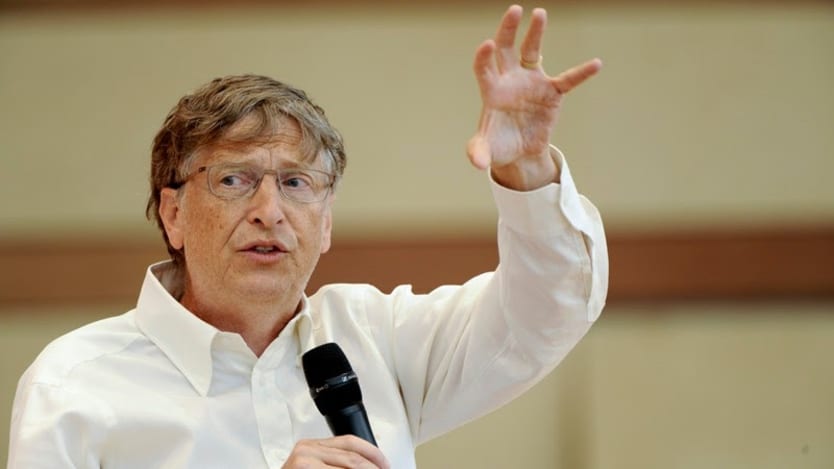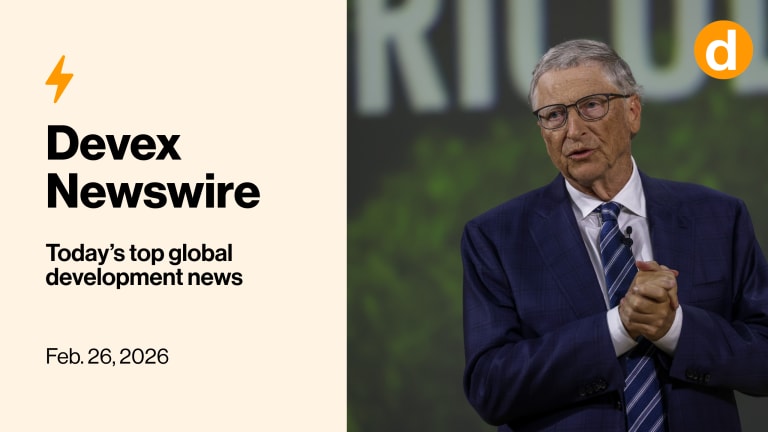'Big concerns' over Gates foundation's potential to become largest WHO donor

SAN FRANCISCO — If the United States government withdraws from the World Health Organization, the Bill & Melinda Gates Foundation is poised to become the agency’s top donor. The potential of this change is raising questions about what such influence from a single private foundation could mean.
WHO’s list of top 20 donors for the two-year budget cycle of 2018 and 2019 reveals that the U.S. provided the agency with $893 million, accounting for 20% of WHO’s budget, whereas the Gates foundation contributed $531 million, or 12% of WHO’s budget.
The Gates foundation accounts for 45% of WHO’s funding from nongovernmental entities, according to figures provided to Devex from WHO. That pool of donors may expand and diversify with the recent launch of the WHO Foundation. But even as WHO ramps up fundraising from nongovernmental entities, support from its member states remains crucial because of the dollars they provide — and because they are accountable to their citizens, experts tell Devex.
How could the US withdraw from WHO?
What's the procedure for withdrawing membership of the WHO? Devex spoke to the health organization's former legal counsel and a U.S. foreign policy expert.
“If a private foundation were to become WHO’s highest donor, it would be transformational,” Lawrence Gostin, faculty director for the O’Neill Institute at Georgetown University and director of WHO’s Collaborating Center on National and Global Health Law, told Devex via email.
When WHO was formed as an intergovernmental organization, it “would have been unimaginable” that a private foundation could have such influence, he continued.
“It would enable a single rich philanthropist to set the global health agenda,” Gostin said, referring to Bill Gates, co-chair of the foundation.
Gates cannot formally set WHO’s agenda in the same way that member states are able to, but if the billionaire behind the foundation called the WHO director-general, he “would likely be on the next plane to Seattle,” he said, referencing the foundation’s headquarters.
“The big concerns are that the Gates Foundation isn’t fully transparent and accountable,” Gostin said. “By wielding such influence, it could steer WHO priorities.”
Gavi smashes replenishment target at virtual summit
The Gavi replenishment secured a record $8.8 billion in funding for 2021 to 2025 on Thursday, serving as a “real injection of confidence into the multilateral system."
Bill Gates expressed his disappointment with U.S. President Donald Trump’s announcement that the U.S. would withdraw from WHO in a press call regarding the foundation’s new $1.6 billion commitment to Gavi, The Vaccine Alliance, which is also a major donor to WHO.
“No donor is interested in just replacing funds that have been taken away, and so I will certainly encourage the United States to stay as a member of WHO and continue the support they provide,” he said.
Gates noted that one-third of U.S. support for WHO is earmarked for polio eradication, which is also a major priority of the Gates foundation, and said he does not see how polio can be eradicated without WHO.
Because WHO is a member state organization, governments have to meet a quota every year through their membership dues, and that funding is fully flexible. Beyond that quota, funding from governments can be specified for certain issue areas, including nutrition, access to medicines, mental health, and more. Nongovernmental donors do not have to provide flexible funding in the same way that governments do, although WHO encourages them to provide as much flexibility as possible.
“The other contributions are always designated for a purpose, and obviously that purpose is according to our priorities and needs,” Cintia Diaz-Herrera, senior external relations officer for philanthropy, corporate, and innovative financing at WHO, told Devex.
WHO gets a lot of questions about how much influence the Gates foundation has, but the agency explains that it is only one of a number of foundations and nongovernmental donors that give to WHO.
“People say, ‘Are they influencing the agenda of WHO?’” Diaz-Herrera said. “No, our agenda is very clear, and it has been for decades, before they existed as a foundation.”
“If a private foundation were to become WHO’s highest donor, it would be transformational.”
— Lawrence Gostin, director, WHO Collaborating Center on National and Global Health LawWHO will not accept funding for any activities that are not in the plans outlined by its 194 member states each year at the World Health Assembly. But Diaz-Herrera noted the alignment between WHO’s and the Gates foundation’s global health priorities. In addition to polio, the Gates foundation has also prioritized maternal and child health, malaria, neglected tropical diseases, and primary health care in its support of WHO, and its full list of grants to WHO can be accessed on its grants database.
Increasingly, foundations beyond the Gates foundation are drawn to the opportunity to work with WHO, which has 150 offices around the world, in order to scale progress on their shared global health priorities.
Because foundations are not using taxpayer money to support WHO, they often have more freedom than bilateral donors to try new things, without the same fear of taking risks, Diaz-Herrera said.
But as a private foundation, the Gates foundation is only accountable to its trustees, unlike governments that are accountable to their citizens.
“The foundation may argue that this is an asset as it makes them flexible and adaptable and less susceptible to changing politics,” Sophie Harman, professor of international politics at Queen Mary University of London, said in an email to Devex. “However it also raises important questions of accountability in global health.”
For private foundations, as compared to public funders, there is not a clear way for citizens to raise concerns with a problematic program, or vote out leadership if they are not satisfied with results, she said.
Because the Gates foundation is such an influential funder of WHO and other global health institutions including Gavi, this “limits and compromises the number of people who will call the foundation out” if something goes wrong, Harman added.
In response to a question during this week’s press conference on whether Gates might encourage Trump to rethink his position on WHO, Gates said a conversation, even if indirectly, was likely.
“I'm hopeful it'll turn into a desire for improvement rather than a withdrawal,” Gates said.
Gates noted the importance of WHO for not just polio, but all global health work, including responding to future pandemics.
Search for articles
Most Read
- 1
- 2
- 3
- 4
- 5








